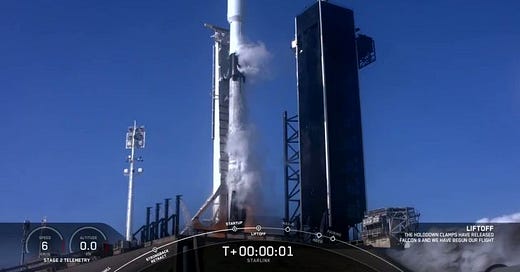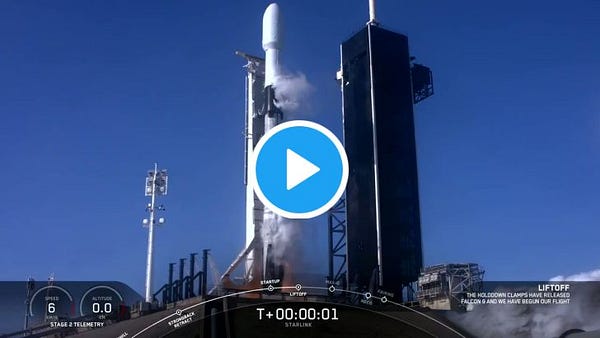Points of Interest #001
Rocket live streams, the $30 Billion dollar algorithm, and Snowden vindicated
Its Thursday, September 3rd and the formless shapeless void of my week has been given form. Manifest from the ether as a newsletter. Hi 👋.
Here are a few things that made me move my eyebrows and made me ask some questions. I’m playing with the format, but I’m aiming to send out a weekly letter with 1-5 topics of interest and more sparingly doing deep dives of things that continue to rattle in my skull.
🤖 Nation State Swiping
TikTok is for sale. It is an absolute social media behemoth. Estimated to be going for $10-30 Billion dollars after the White House strong armed the Chinese owned company into selling to an American buyer lest it be banned.
China now says the “For You page” algorithm, the thing that makes Tik… Tok, is intellectual property too valuable to be sold to another country. Meaning one of its possible buyers is left buying a brand and app user interface without the quintessential secret sauce.
Its an interesting game of oneupmanship and protectionism that just happens to reveal that China is now in a position to flip its script on intellectual property and trade secrets as a leading producer of IP and not just a hungry upstart.
Questions I’m thinking about…
To what extent do the risks of China’s ubiquitous surveillance state actually extend to Americans, Indians, or others?
How much of this has to do with TikTok’s threat to Western cultural power?
If we cut off China’s ability to compete in our market do we risk our ability to compete in theirs? Or does a strong stance give the US leverage to open up China to the huge list of companies they currently firewall?
Recommended Reading
🚀 The Space Revolution Will Be Televised
I’ve been watching a lot of rocket launches. Vertical shoots. Literal punctuation marks made in the atmosphere. A chemical burst of energy that feeds my soul when my body has no energy of its own.
You can watch live streams of the rocket launches on Youtube via NASA, company specific streams, and independent channels. I enjoy Everyday Astronaut’s streams, and his site keeps a calendar of launches.
I’ve found streaming events in this era of recommended isolation to engage me with varying degrees of success. Zoom Happy Hour? A great time with the right company. Virtual concert? Ehhhhhhhh…. I’d rather watch an NPR Tiny Desk concert.
But rocket launches are still invigorating. The count down, the visual spectacle, the morbid/thrilling opportunity for violent and explosive failure (RUD: “rapid unscheduled disassembly”). Its primal, dangerous, optimistic, and futuristic all at the same time.
There is a lot to think critically about in commercial spaceflight, but I have to admit its just a really compelling diversion. I highly recommend watching a launch if you’re even the least bit space-curious.
Questions I’m thinking about…
At what point does a rocket launch become so frequent, safe, and uneventful that a livestream stops being an event? Will I just become a rocketspotter?
At what point can I affordably go to space? Or just sub-orbital?
Will the private space industry fully transition from a government Contractors vs Musk, Bezos, Branson, LLP ecosystem into something totally self reliant? Or is spaceflight destined to look more like the commercial air economy. Boeing, Airbus, and the also-rans?
🎯 Edward Snowden was right
The NSA has engaged in massive illegal surveillance of US citizens for years.
It seems somewhat fitting that the newspaper that broke the leak story with Edward Snowden, the Guardian, now gets to publish this news article:
NSA surveillance exposed by Snowden was illegal, court rules seven years on
The thing I remember most about when the leaks happened is that they were simultaneously explosive revelations and at the same time met with some level of resignation.
To a millennial generation coming of age with the internet it seemed almost a perfunctory revelation: a public acknowledgement of a privately suspected truth. They were watching, listening, and recording your phone with relative impunity.
Gene Hackman was also right, by the way.
Now the gen-z meme is the FBI guy watching you through your webcam, following your life struggles, and being a goofy avatar of government overreach.
I think the difficult thing is that the way our lives are monitored is actually much more complicated than saying “They” are always watching us. In the US and, much of the world, the Venn diagram of parties with some access to huge volumes of data about your life is a modern art masterpiece of circles representing private and public institutions, markets, and local laws.
I do think we can make our data safer and measurably more private, but to a certain extent we’d probably do well to invest energy into making sure data about is used is ethically in the contexts where it can hurt us the most.
Questions I’m thinking about…
What does a privacy bill of rights look like? Can we enact one without crushing the creature comforts we’ve gained from companies that gorge on our data today?
Does our information regulatory future look more like China, Europe, or something wholly new?
Will we pardon Snowden?
That’s a wrap
That’s all that’s fit to print for now. Got an answer to one of my question? Want me to dive deeper into a topic? Let me know.
Till next time ✌️,
Jóhann





